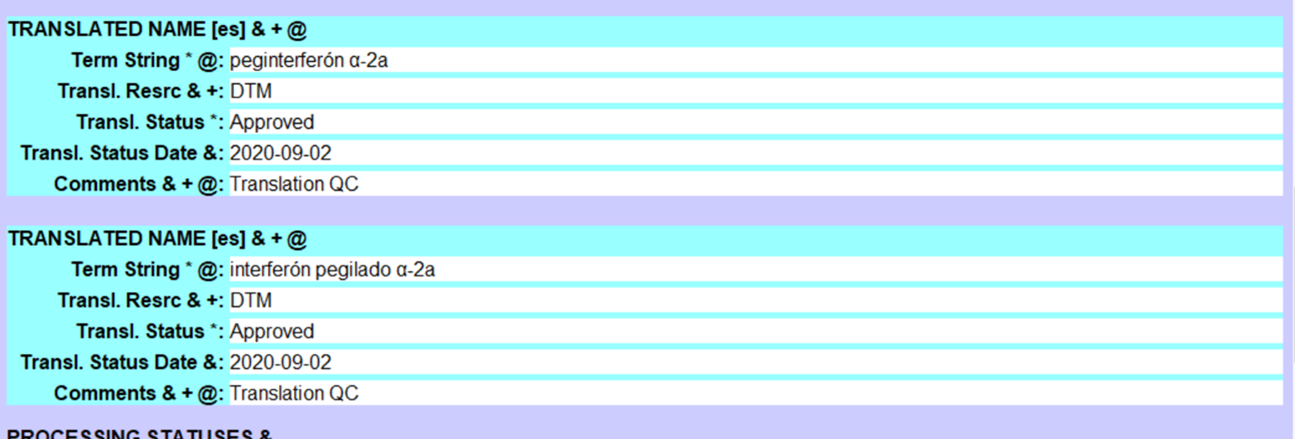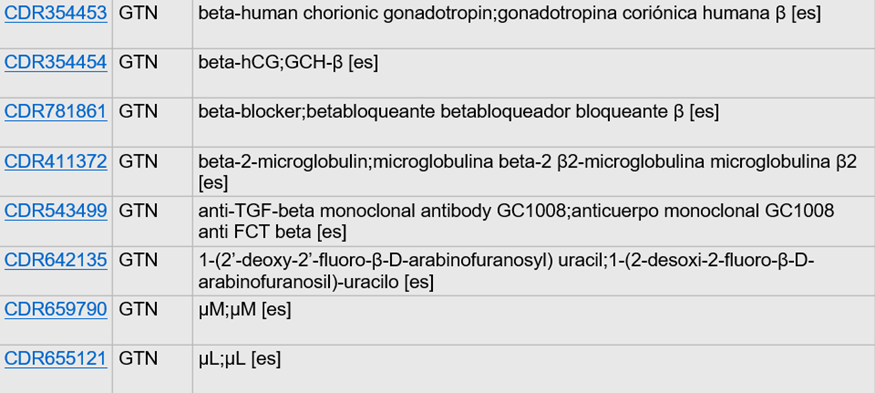CDR Tickets
| Issue Number | 4894 |
|---|---|
| Summary | Special character display on Cancer.gov |
| Created | 2020-09-18 09:44:48 |
| Issue Type | Bug |
| Submitted By | Osei-Poku, William (NIH/NCI) [C] |
| Assigned To | Englisch, Volker (NIH/NCI) [C] |
| Status | Closed |
| Resolved | 2020-10-09 10:08:38 |
| Resolution | Fixed |
| Path | /home/bkline/backups/jira/ocecdr/issue.274981 |
Two alternate names with a Greek special character were added the Spanish GTN. While they display well in the CDR they don't display well on Cancer.gov. Please see attached screenshots. Could you please investigate?

Document ID, please.
If I remember correctly there had been issues in the past with terms not being included (or not being properly included) in the A-Z list if the name started with (or contained) greek (or non-ASCII) characters and the decision was made to write those characters out as alfa, beta, gamma, etc.
However, I'm surprised that I do find some terms again including greek characters (e.g. μL). The characters for these terms are displayed properly although the term is displayed as part of the "#" list when one would expect it to be included in the "M" list. So, these terms are not necessarily listed within the A-Z list where you would expect them but I think that's another story.
So, before I start looking into this issue I would like to know if the Spanish TermString really should be "peginterferón α-2a" considering that the English name does already replace the greek character with "alfa" and most other terms including greek characters have been "translated" to alfa, beta, gamma, etc. as well.
Do you have any thoughts about this, ~juther?
I also remember a decision awhile back to replace the Greek characters with the full spelling in the dictionary. I think we should be consistent and either include the Greek letters in also-called terms or not (I think we should always spell them out as well). It seems like most of the terms do not include the Greek letters based on this earlier decision, although I didn't do an exhaustive search. It would be good to see if ~mbeckwit has any preferences on this too.
CDR346467
The decision to replace the Greek characters was based on a problem we identified with searches on Cancer.gov that was reported in [CGOV-10760 ].
The problem was fixed with the release of the new dictionary API so there is an ongoing task to revert to using Greek characters again to keep things consistent.
Thanks for the background on this, ~oseipokuw!
The decision to replace the Greek characters was based on a problem we identified with searches
I don't think the problem with the search was the only reason why the decision to spell out the greek characters was made. As I said, especially for terms beginning with a greek character there's still an unresolved problem. In fact, that's true for Spanish terms starting with non-ASCII characters, too, e.g. ácido, which is not listed as part of the "A" list but as part of the "#" list.
Did somebody just open a can of worms? 😃
Clarification in CDR meeting: Greek characters are still spelled out in English terms but not in Spanish terms, where the Greek characters are used.
Need to add a new ticket with WCMS dependency to have terms with diacritics sorted under the same letter as terms without diacritics. Volker will do.
The related ticket has been created and ~bkline already implemented it.
According to Linda, only alternate names contain Greek characters so they will just remove or not use those alternate terms that have Greek characters. Greek characters are not contained in the regular dictionary entries. .
In that case, it sounds like we can close this ticket.
The issue with the terms sorted as part of the #-list on Cancer.gov is being addressed in a different ticket.
So does this mean we only want cancer.gov visitors to be able to search for spelled-out Greek letters in the English names but not in the Spanish names?
They should be able to search for spelled-out Greek characters as well since they are spelled out in the Spanish terms as too.
This ticket is closed but I wanted to provide additional information with regards to how Greek characters are handled in the Spanish Dictionary and to correct earlier information that Greek characters are all spelled out in the in the Spanish dictionary. It turned out that "alpha" is spelled out only because Cancer.gov displays the "alpha" character as "a" but "beta" is not spelled out since Cancer.gov displays that correctly. Here are a few examples of dictionary terms with "beta" not spelled out.

| File Name | Posted | User |
|---|---|---|
| Greek special character display_cancer.gov.png | 2020-09-18 09:43:38 | Osei-Poku, William (NIH/NCI) [C] |
| Greek special character display.png | 2020-09-18 09:43:38 | Osei-Poku, William (NIH/NCI) [C] |
| Special characters Spanish Dictionary.png | 2020-10-15 11:58:59 | Osei-Poku, William (NIH/NCI) [C] |
Elapsed: 0:00:00.001362